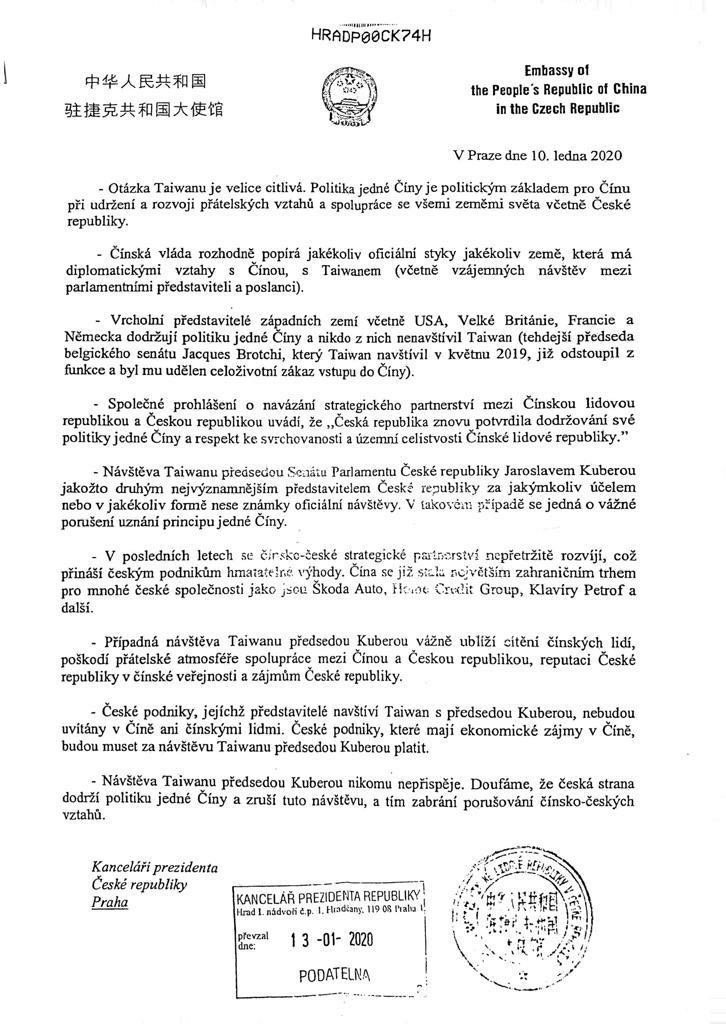Yesterday’s revelation by Czech media that the PRC embassy had, with the approval of the president’s office, threatened the chair of the Senate with consequences for the Czech economy if he visited Taiwan throws new light on the political dynamics behind the “economic diplomacy” motto.
In 2019, the chairman of the Czech Senate, Jaroslav Kubera, announced a trip to Taiwan as head of a business delegation. Various voices in local politics criticised these plans out loud, most notably the country’s CCP-friendly president Miloš Zeman, who said Kubera’s Taiwan visit would mean the end of their friendship. The PRC’s direct attempt to prevent the visit was not, however, made through public channels.
Yesterday, an article by Lukáš Valášek and Helena Truchlá for Aktuálně reported on a leaked letter from the PRC embassy, dated 10th January, that directly threatened the Czech Republic with consequences for its economy should the visit take place as planned. The letter went through the Czech presidential office, which, according to the Aktuálně story, endorsed it with its own attached comments and forwarded it to Kubera. While the office has since questioned the authenticity of the letter, the foreign ministry reportedly protested to the embassy as Kubera’s successor decried the threats as “a violation of our sovereignty”. Kubera died seven days after the letter’s date, but probably read it: as it emerged yesterday, it was found in his office. Kubera’s successor as chair of the Senate, Miloš Vystrčil, has stated he is yet to decide whether to go ahead with the visit.
The planned business delegation to Taiwan, a country whose investments in the Czech Republic are more significant than China’s, was hardly a political gesture of antagonism to the CCP, as the casual observer might perhaps extrapolate from propaganda-aligned narratives that postulate a “polarisation” of Czech debates on China. Indeed, even after the letter was sent, Kubera attended a Lunar New Year gala supported by the PRC embassy, sponsored by CCP “champion” Huawei, and coorganised by United Front-linked associations that included the local affiliate of the China Council for the Promotion of Peaceful National “Re”-Unification (中国和平统一促进会).
The tone and text of the letter provide a succinct illustration of the character of a relationship with the PRC that used empty promises of trade and investment as cover for political influence and élite cooption work. Our description of Czech “economic diplomacy” as a propaganda meme concealing influence operations applies more generally, as we have discussed elsewhere, to the “16 [now 17] + 1” initiative, and, as Nadège Rolland has shown, Xi’s larger “Belt and Road” concept. The threatening letter eschews diplomatic protocol; it is written as a series of “bullet points”, lacking even a salutation. It appears to have been translated by a non-native speaker, from a Chinese original into nearly flawless Czech.
Below we provide a full translation of the letter, whose original text was first made public by Aktuálně. Footnotes were added when unidiomatic passages in the original affected the translation.

Prague, 10th January 2020
-
The Taiwan issue is highly sensitive. The One-China Policy serves as the political basis for China in order to preserve and develop friendly relations and cooperate with all countries in the world, including the Czech Republic.
-
The Chinese government resolutely opposes1 any official contact between any country that maintains diplomatic relations with China and Taiwan (including any mutual visits between parliamentary representatives and deputies).
-
Top representatives of Western countries, including the USA, the United Kingdom,2 France and Germany, abide by the One-China Policy, and none of them has visited Taiwan (Jacques Brotchi, the then Chairman of the Belgian Senate, who visited Taiwan in May 2019, has already resigned from his office and received a lifetime ban from entering China).
-
The joint declaration on the establishment of the strategic partnership between the People’s Republic of China and the Czech Republic states that “the Czech Republic has again confirmed its observance of the One-China Policy, as well as its respect towards the sovereignty and territorial integrity of the People’s Republic of China”.
-
Whatever its form and purpose, a visit to Taiwan by Jaroslav Kubera, the Chairman of the Senate of the Parliament of the Czech Republic and as such the second highest representative of the Czech Republic, bears the marks of an official visit. That would3 constitute a grave violation of the recognition of the One-China principle.
-
The Chinese-Czech strategic partnership has been continuously developing over the last few years, thus bringing tangible benefits to Czech enterprises. China has already become the largest foreign market for many Czech companies, such as Škoda Auto, Home Credit Group, Klavíry Petrof and others.
-
A potential visit to Taiwan by Chairman Kubera would4 seriously hurt the feelings of the Chinese people,5 damage the friendly atmosphere of cooperation between China and the Czech Republic, the Czech Republic’s reputation among the Chinese public and the interests of the Czech Republic.
-
Czech enterprises whose representatives visit Taiwan with Chairman Kubera will not be welcome in China or by the Chinese people.6 Czech enterprises with economic interests in China will have to pay for Chairman Kubera’s visit to Taiwan.
-
Chairman Kubera’s visit to Taiwan will not benefit7 anyone. We hope that the Czech side will observe the One-China policy and cancel this visit, thus avoiding damaging Chinese-Czech relations.
Attn.: Office of the President of the Czech Republic
Prague
[Seal of the Office of the President in Czech Republic confirming receipt on 13th January 2020]
[Seal of the Embassy of the People’s Republic of China in the Czech Republic]
-
Rozhodně popírá. The unidiomatic Czech phrase is likely a calque of jiānchí fănduì 坚持反对, common in PRC officialese — All the notes are the translators’.↩︎
-
Velká Británie, literally ‘Great Britain’. Diplomatic correspondence would normally use the UK’s official name in Czech, Spojené království.↩︎
-
No conditional in the original.↩︎
-
Future perfective in the original.↩︎
-
Literally “Chinese people’s feelings”.↩︎
-
Literally “by Chinese people”.↩︎
-
Nepřispěje, literally “will not contribute”.↩︎
